Nicholas Stone is the CEO & Founder of Bluestone Lane, which is an Australian artisanal coffee and cafe brand that aims to become your local spot and a part of your daily ritual. Previously, he worked in finance at UBS and ANZ. Every single thing I’ve tried at the multiple locations has been absolutely delicious, and I feel a sense of relief knowing it’s healthy and doesn’t have hidden additives. Learn about his story and company below:
Walk me through your background.
I grew up in Melbourne Australia. In my final year of high school, I was selected to play professional Australia Rules Football (called AFL) in Australia, which I played for 6 seasons. While playing, I also attended university completing a Bachelors’ Degree in Business (Banking and Finance). By the time my career finished as a professional footballer, I had completed my degree and began an internship at UBS Investment Bank.
Soon after I met my future wife, Alexandra, who moved to the New York to pursue her modeling career as a part-time job between her Bachelor of Biomedical Science university studies. I then spent the next few years trying to transfer to America to be reunited with Alexandra and in order to facilitate this move, I began my MBA in Australia and exchanged to the US.
In NYC, consumption of coffee is high, but the total premium experience is quite inconsistent. I realized there was an opportunity as I was personally an unsatisfied customer, so I worked on a business plan for more than 12 months which ended up bringing Bluestone Lane to life in July 2013. Since our humble opening, we’ve opened 20 stores in 4 years and are set to open 15 stores in the next 12 months.
We have 3 locations in Philadelphia, and will be in 6 US cities this year, including: New York, New Jersey, Philadelphia, LA, SF and Washington D.C. There is a lot of opportunity to take Bluestone Lane to numerous US cities given the customer demand for premium, specialty coffee and café experiences.
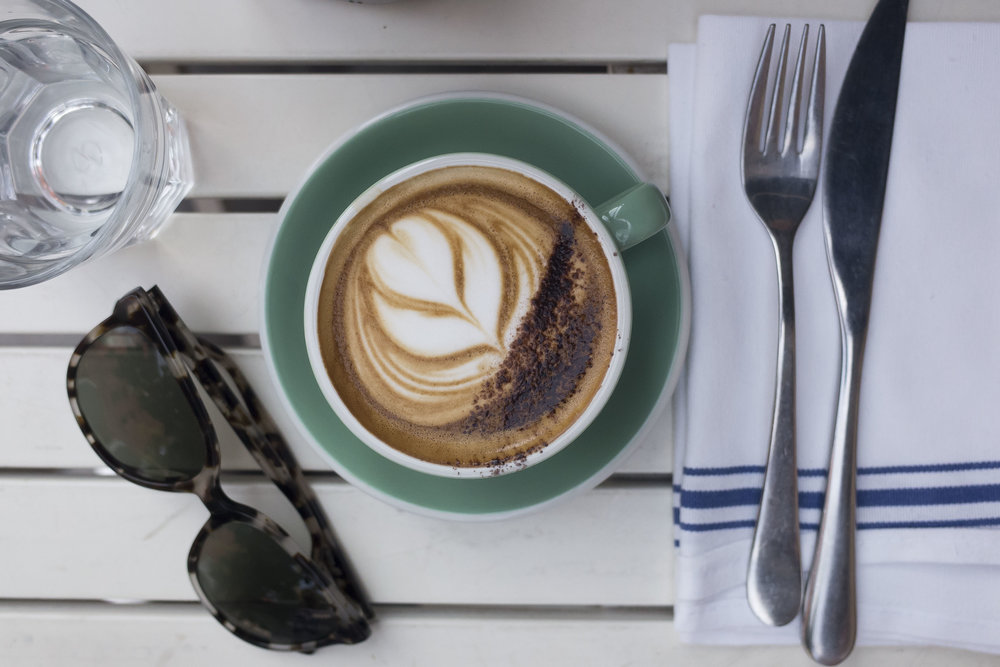
How is Australian football different than in the U.S.?
AFL Football in Australia is a bit like a hybrid between rugby, soccer and Gaelic football. It has full tackling and contact, requires a high skill-level and involves a lot of running. It’s less segmented than American football where the defense is never on at the same time as the offense and it also doesn’t have the unusual occurrence that you can play defense and never touch the ball in your entire career. In AFL football, everyone touches and kicks the ball.
When did you move to NYC, and what prompted the move?
I moved to Manhattan in 2010 in order to be in the same city as my girlfriend, now wife, Alexandra.
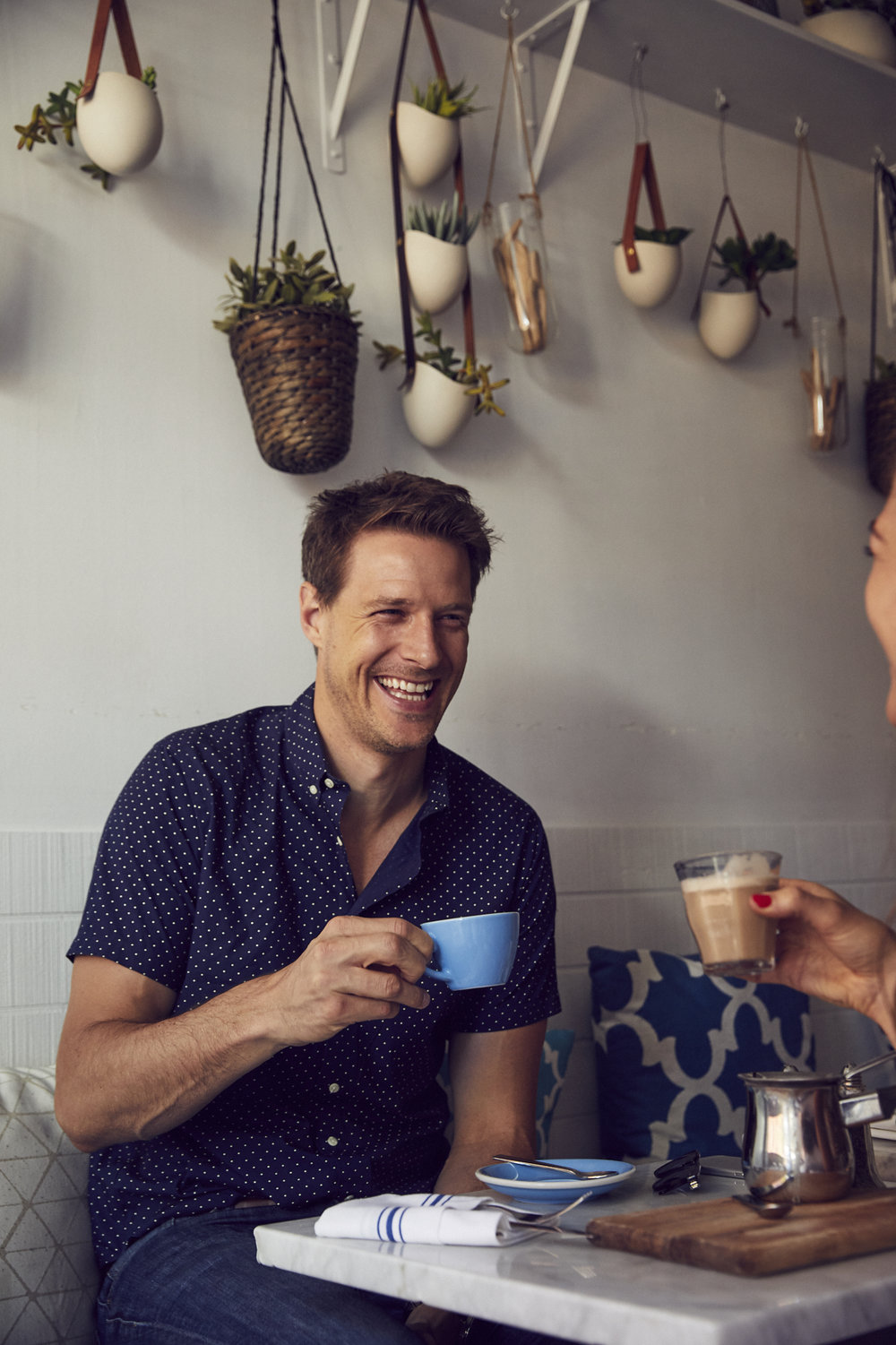
How did the idea of Bluestone Lane come about?
When I moved to New York, I missed my daily routine in Australia. I felt the coffee options were heavily transactional, and I was lacking developing a deeper connection with a particular café or their staff. Working as an investment banker, I was looking for that daily quick escape.
I wanted a place where I felt a deep connection, a place that was my “local”. A place where I could go for premium coffee and healthy nutritious food. A place where they knew my name, my face and where I could connect with my colleagues, clients, wife, friends or just have a moment by myself to read the newspaper and disconnect.
What are the different kinds of locations that Bluestone Lane has?
The cafe side of the business is a broader proposition that operates a lot like a restaurant, featuring an expansive menu and our full offering of coffee and tea. The coffee shops are meant to be small, hole-in-the-wall spots that are a bit hidden. They provide a daily respite and an escape where you can grab a coffee, chat with a friend, read the paper or people watch and then head back to work.
We have about 3 coffee shops for every cafe. The first cafe we had was in the West Village. We named it Collective Cafe because the only way we were able to bring it to life was through the collective support from so many Australians living in NYC and our coffee shop locals coming back and bringing their friends.
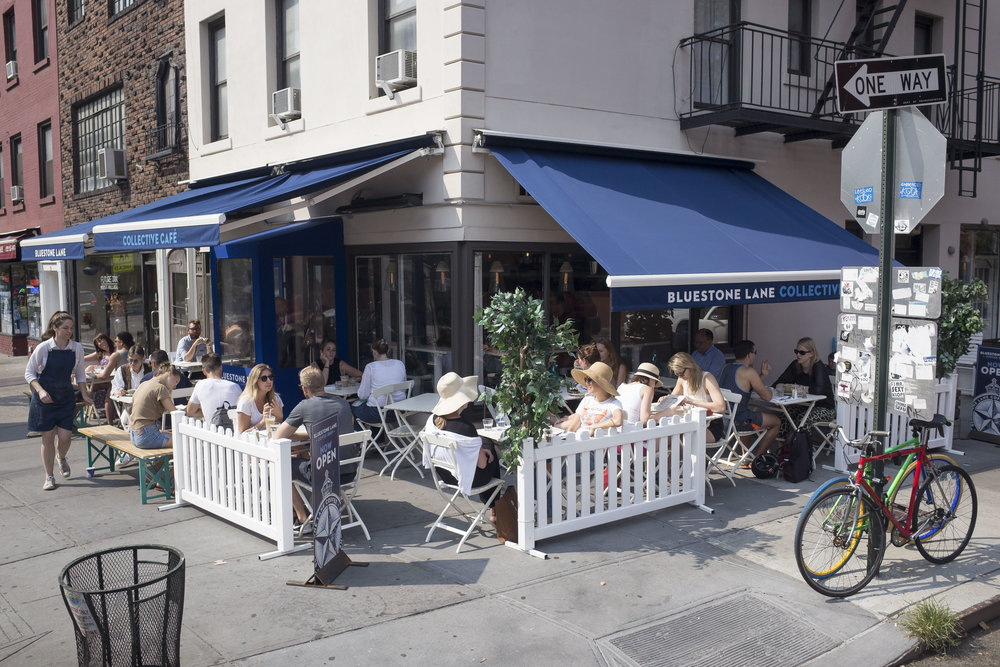
How did you learn to start and grow a business?
This is my first endeavor into hospitality, coffee or retail. I had no practical experience, but I had nearly 12 years of business experience advising international companies how to manage risk, accelerate and diversify. Furthermore, I was a former professional sportsman that had always loved being part of a congruent team that adopt a high-performance culture.
In assessing the ability to execute the business plan I applied my business knowledge, a curiosity of successful consumer brands, my expertise in understanding the drivers of productivity, utilization and return on capital to develop a sustainable value proposition.
The next step was to complement this with my personal customer perspective and what I missed from my daily Melbourne life now that we were living in New York. I figured there were enough people that were looking for a broader premium coffee and café experience, rather than a transaction provided by a caffeine dispensary.
Succinctly, I applied my customer perspective and combined it with my business knowledge. From an entrepreneurial perspective, I prioritized my focus on not losing money rather than it being highly lucrative.
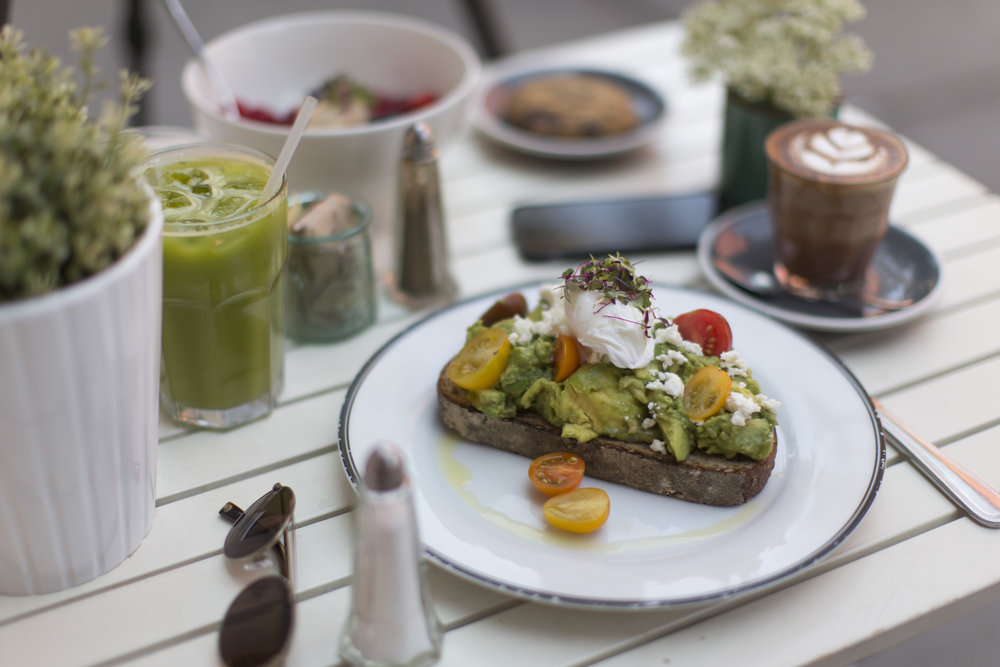
Once you had the idea, what did you do to prepare before opening?
I had a clear business model and a lot of discipline around knowing exactly what Bluestone Lane was going to be and stand for. I spent a lot of time focused on how I can build a premium retail brand, in a capital efficient way, avoiding investing heavily into capital-intensive things like a roastery. I wanted to build a brand and have it validated by NY, giving it a chance to scale, and ultimately be more sustainable.
Alexandra and I did a tremendous amount of research (which was quite a tasty and enjoyable experience). I analyzed the competitive landscape and spent a lot of time at Starbucks building the business-case from the bottom up: counting customers, when they came in, how much they spent, the ratio of grab and go versus dine-in, the differential in spend, their labor model and what I thought they were likely paying in rent. I tried to figure out their cost structures in a detailed way in order to shape our value proposition, and how we could compete.
As the founder, I have tried to focus on building a brand and universally adopting a focus on capacity utilization and productivity, not absolute costs. These business concepts can be agnostically applied to all different business types, no matter the industry.
How did you choose the name and design the logo?
The name is a reference to the laneways that exist within Melbourne’s central business district. They are made out of cobblestone, or bluestone slate. When the British created their colonies, they frequently created laneway systems that you find in most commonwealth countries. It’s a reference back to where the brand comes from, which is Melbourne, Australia.
Our logo includes the crown from the Victorian state flag. Melbourne is the capital of the state of Victoria. It’s a reference to being a premium, specialty and sophisticated brand. For premium coffee and cafe culture, there is no better place in the world than Melbourne – it’s the Silicon Valley for premium café and coffee experiences.
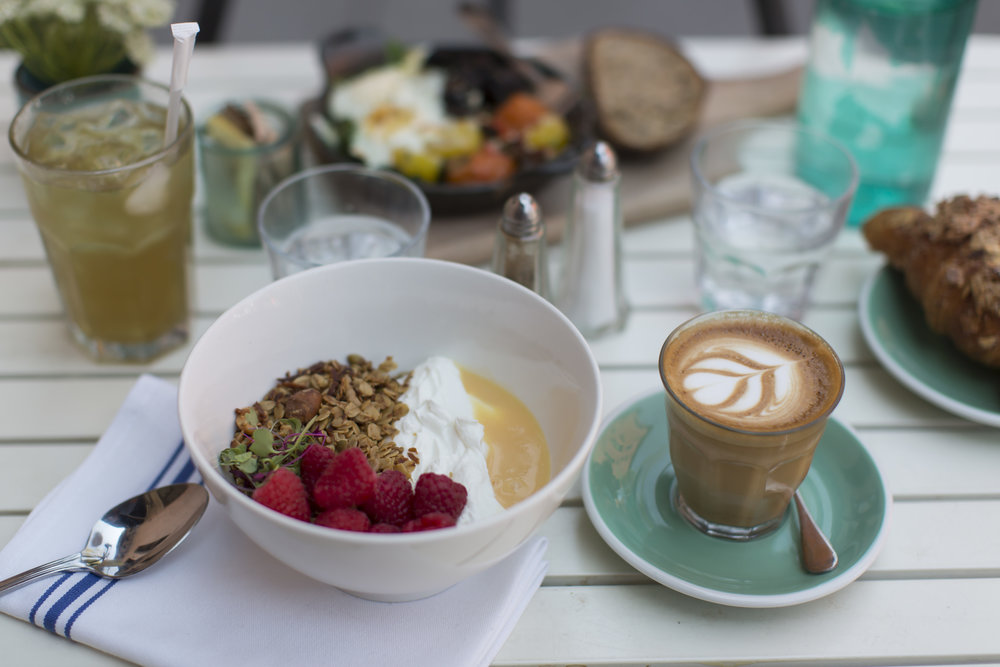
How did you choose the menu?
My wife, Alexandra, is the brains and influence behind the menu. She works on the cafe menu quarterly with other members of the team (many of whom are professional trained chefs). For the coffee shops, our regional operations director (Laura Simpson) is a UK trained fine dining chef and she helped us with this. We try and bring the food trends in Australia to New York while tailoring it to the local produce we can acquire and the city’s taste. We keep it simple, healthy and local.
Where do you source the ingredients for your food and beverages?
We try and source the best ingredients that we can that are primarily organic. We roast our own coffee in our roastery in Dumbo, Brooklyn and only buy Rain Forest Alliance certified beans (we are passionate advocates of the RFA). The roastery also includes a best-in-class education lab where we can train our employees, wholesale partners and offer private training for subscription coffee customers.
We are selective in the type of milk we use, and we try to buy everything we can directly from local farmers. We get a lot of products from Upstate New York. Alexandra deigned a custom cold-pressed juice range that’s named after iconic Melbourne suburbs and towns. We find that our Bluestone Lane local likes healthy, natural and unprocessed food. We don’t like to add sugar to anything (that includes our coffee). We also have a strategic gluten-free bakery partner in Husk Bakeshop, which makes undoubtedly the best Gluten-Free baked goods in NYC.
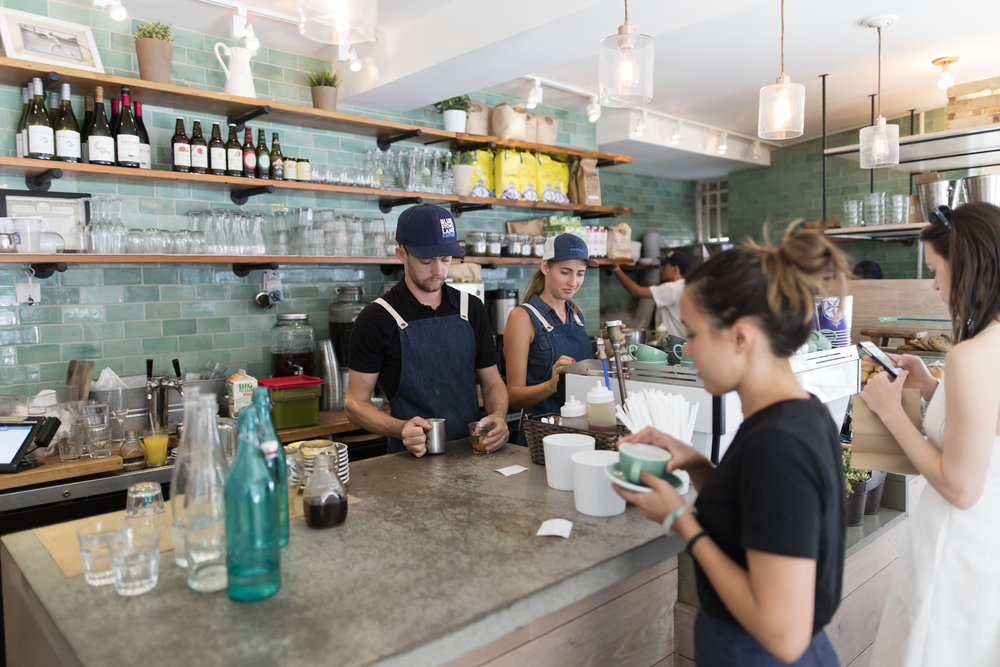
What is the most popular beverage on the menu?
It would be the Flat White, then our Cold Brew following by our turmeric Golden latte.
How did you choose the locations?
We have a great process of site selection, led by Jon Krieger, and have internalized this process to access unique opportunities. Coffee shops are more commonly found in high-density areas where we focus on local retention. We have a lot of coffee shops that are in business districts like Financial District or Midtown. The cafes are more commonly located in residential or destination areas like Brooklyn, Upper East Side and the West Village.
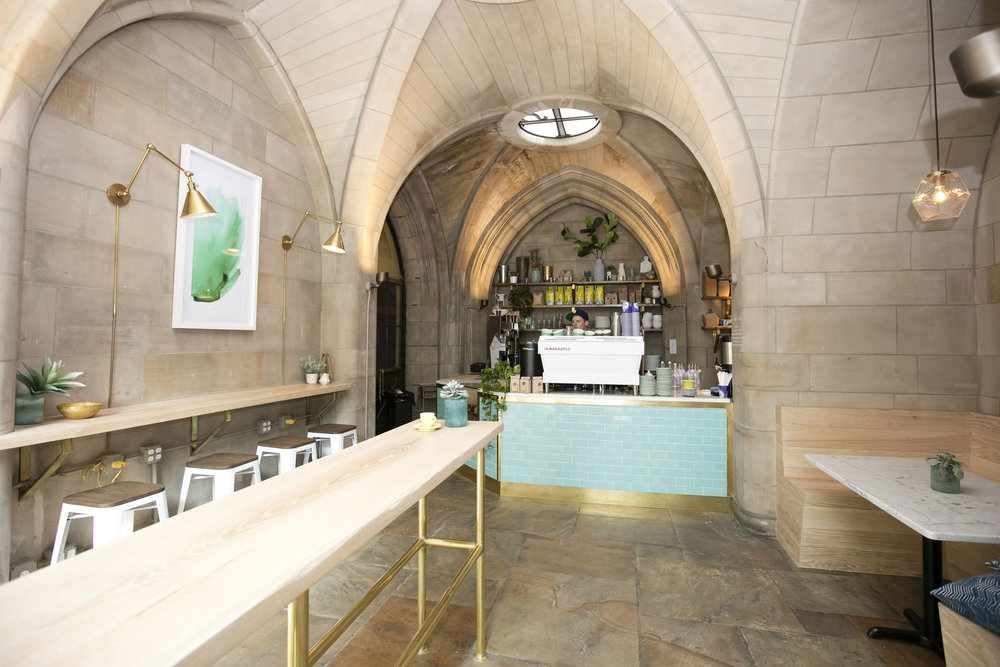
What does signing a lease look like?
It takes longer than you think. The process depends on the landlord. It’s pretty expensive, and it could be much more streamlined (no doubt this will change significantly in the future).
Describe your team, and how quickly did it grow?
I am very proud of our team and the success of Bluestone Lane has been due to collective effort from them all. We had a very small team until June 2016, which coincided with my move to full-time CEO. Prior to this, I was still working in banking, juggling two jobs and we were able to open the first fourteen stores.
Now I just have one business focus, which has been a great relief. It’s been amazing and I’m proud of the group we’ve assembled. They have the right values, a fantastic work ethic, remain humble and are very creative. They’re team-oriented and want to be part of something special. The way I’d like to lead the team is as a coach, empowering them to run their business quite autonomously. I jump in as needed to remove barriers in order to help them succeed.
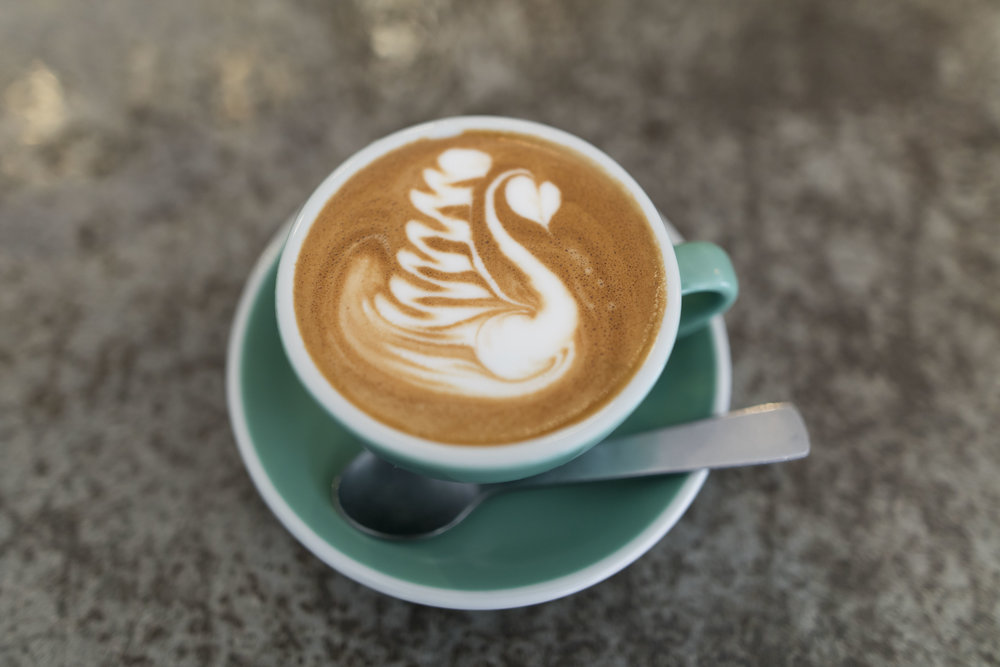
What challenges did you face in the beginning?
The challenges can at times be significant and complex, but that’s why the opportunity to build a brand and to make a difference to so many teammates and locals, is so exhilarating. Two that come to mind include finding the right site and hiring the right staff to build a culture.
You can overcome a lot of barriers when you’ve done your research in order to mitigate some of the down-side and to help you forecast what’s most likely is going to happen. I had to remain disciplined what was Bluestone Lane’s value proposition, brand position and cost structure
What does you day-to-day look like?
I work with the executive team on what’s going on in their world, overseeing at the strategic level a broad array of activities inluding our future plans and projects, new store openings, existing store performance, capital structure, investor relations, new adjacent business opportunities and the internal production business. I’m constantly looking at our strategy, value proposition and what we need to do on the technology front.
I think about how we can be more compelling to locals and brainstorm ways to innovate. We consider who’s out there and what’s doing well, whether in hospitality or other types of consumer focused businesses, and often test if it could be applied in some way or another to our business. I try to be as objective as possible when assessing our business and because I don’t have a background in hospitality, I tend to find that I often challenge preconceived notions. Some of these observations and changes have been beneficial (many perhaps not)!
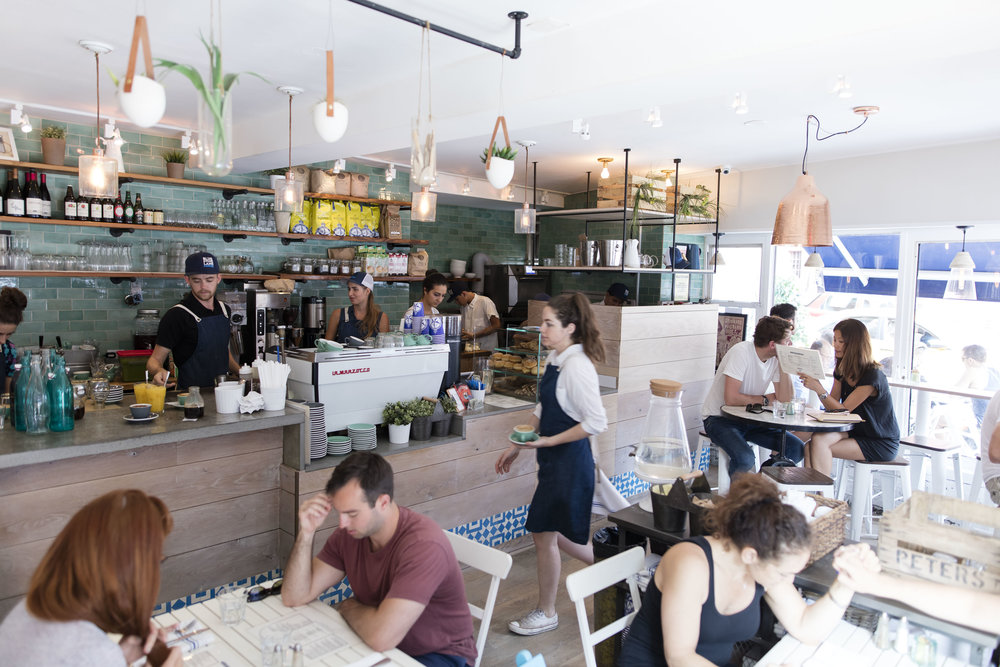
How often do you go home to Australia?
I go home 3 or 4 times per year. My brother has relocated to NYC from Melbourne as well, working as our Marketing Director. In Australia he worked with the leading boutique advertising agency as an Account Director of a global beverage consumer brand. He’s been a fantastic influence on the culture of the organization, leading from the front and he’s brought some great insight into how to develop and scale a brand.
He makes sure that when we’re creating our locations, they are not just a retail environment, but also something more. When Alexandra and I are home we spend time each day conducting research, travelling to different cafes and restaurants to find inspiration (it’s a pretty great perk when you come home). I also spend time with friends and family. I miss the Australian lifestyle and my family and friends.
I was able to have such an amazing childhood and education, which helped facilitate the opportunity for Alexandra and I to live and work in the US for the past 7 years. Eventually we will move back to Australia, but right now the focus is to continue growing the business here in the US.
How is the coffee scene different in NYC & Australia?
In Australia, it’s about creating a premium immersive experience where you feel as a customer a sense of ownership and advocacy. We don’t think of our guests being customers, rather they are what we consider locals. Your local coffee shop or café should be a place where when you come in, the staff recognize your face, know your name and your favorite order. It provides a natural sense of comfort and a daily escape.
It’s tough to generalize any coffee scene, but if I was asked to describe it simply, then I would say it offers premium coffee, tea and healthy, non-processed foods in a tasteful environment that looks great and offers locals a respite each day. It would have sincere, meaningful and engaging customer service.
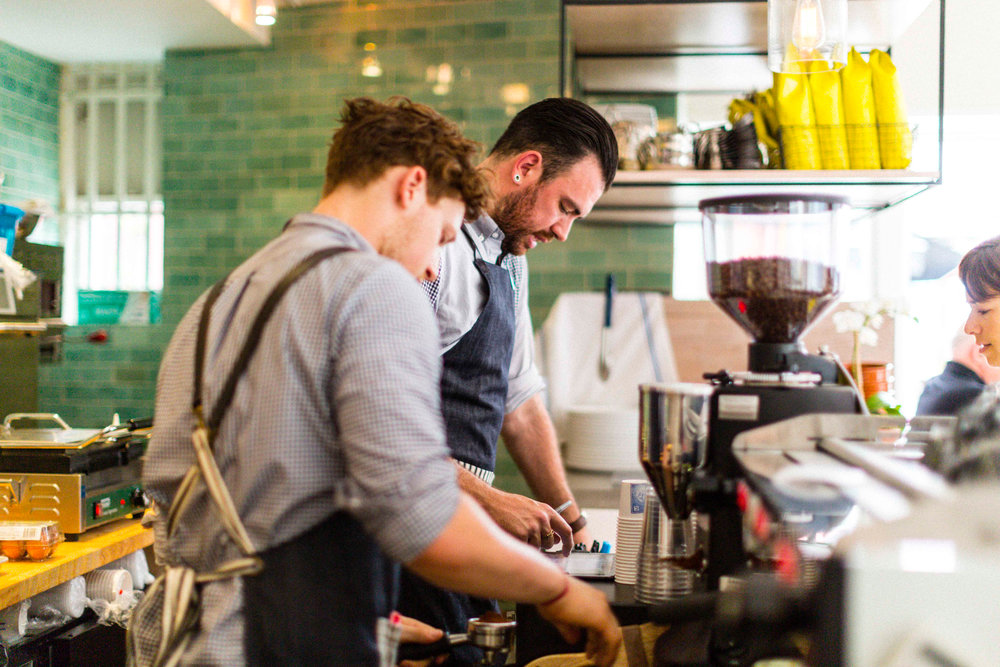
How would you describe your role as CEO?
My role is to set the strategic direction of the company and lead with the right values that helps foster a high-performance environment. I coach and hopefully inspire our executive team, while removing barriers for them to succeed. I’m a big believer in empowerment and autonomy, with appropriate levels of accountability and performance standards.
I often feel my role is like constantly working on a giant jigsaw puzzle where some days the pieces fit, and sometimes they don’t. You’ve got to find a way to make it work. We serve thousands of customers 7 days a week, 363 days a year, and it’s my job to help foster our team’s relentless focus on making each interaction with our locals a success.
We have developed an organizational culture that concentrates on collective values and that cares passionately about providing premium experiences.
How do you determine the pricing for each item?
It’s a function of what the competitors are doing, how much our products cost, the type of margin we need to sustain based on labor costs, real estate, other operational expenses and what we need in order to invest. You’ve got to decide if you’re premium or budget, and whether you’re transactional vs. experiential.
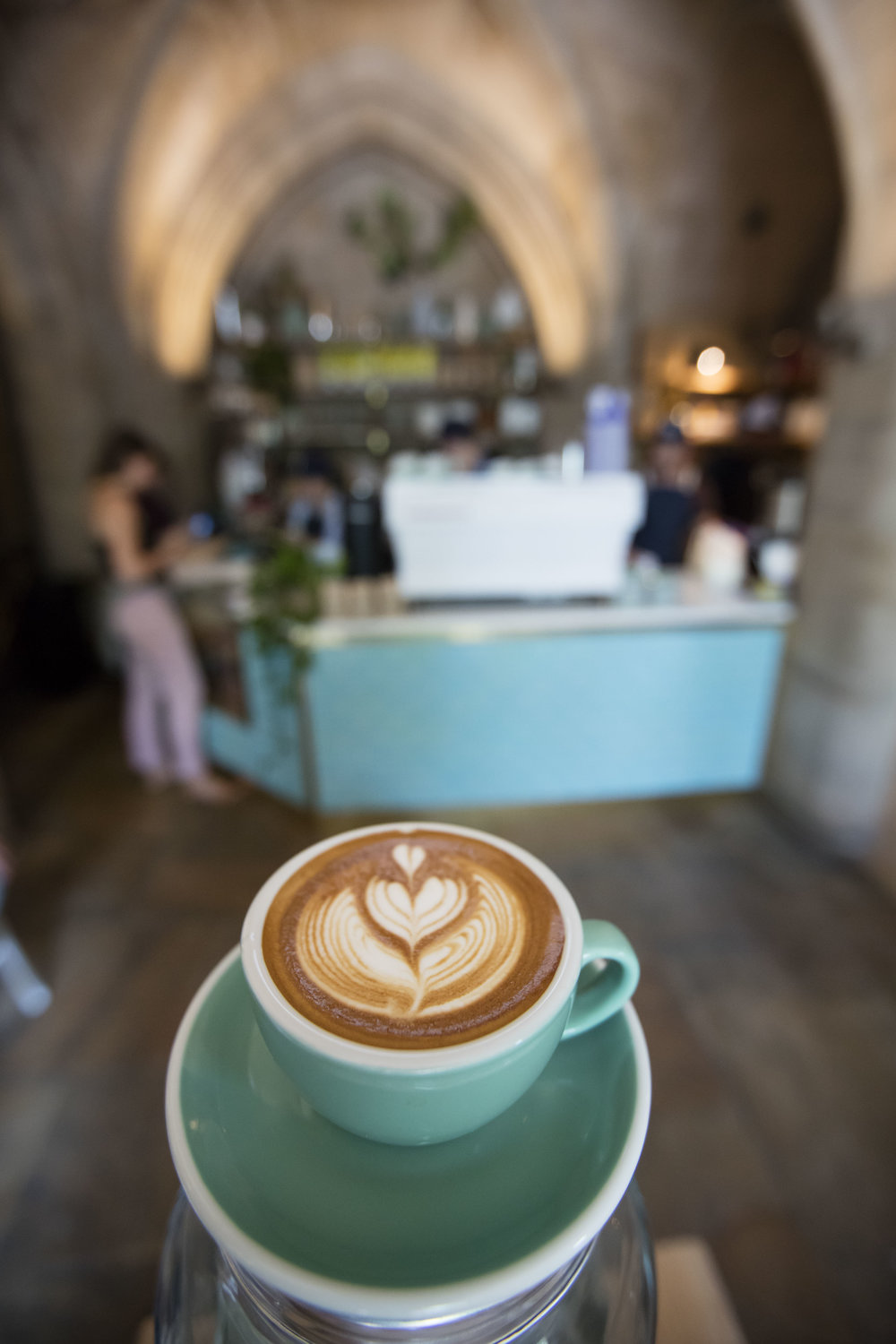
How did you design the space in each location?
For the first 10 or so stores we partnered with a talented Australian designer, Julia Sullivan. Now we primarily manage the design process internally and have a prescriptive view of what works, what doesn’t and what our locals like.
What do you know now that you wish you’d known from the start?
I think you need to be careful not to believe everything and everyone. I’m a big believer in under promising and over delivering. It’s fair to say I have had some people come in and out of the business that have promised a lot and their proclaimed value has not materialized, especially if they don’t truly understand the brand, our culture and what a premium Australian coffee and café experience involves.
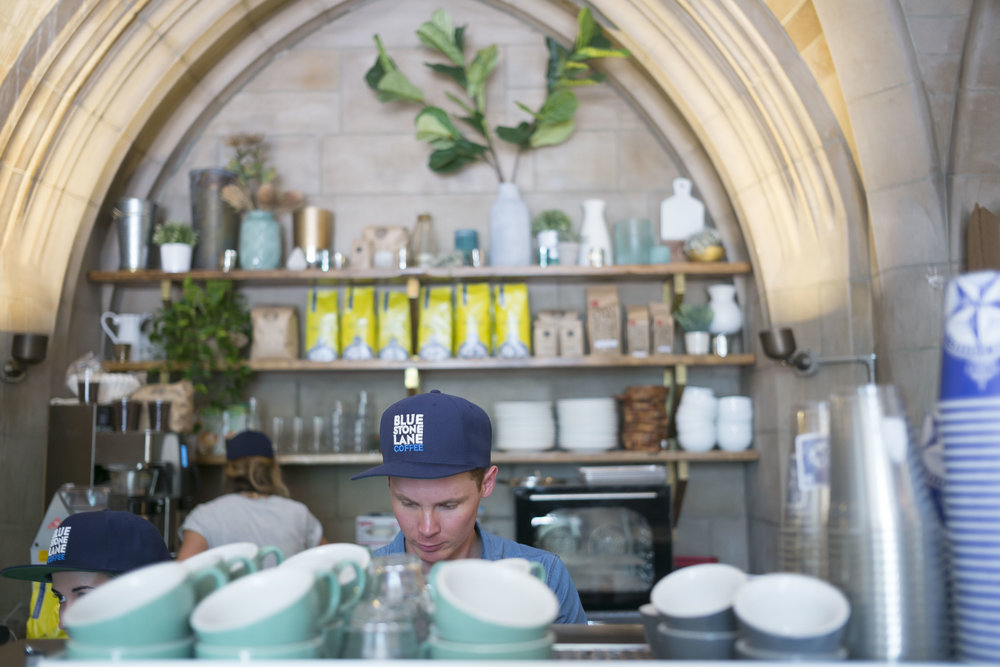
What advice would you give to someone interested in starting his or her own business?
If you have a great idea, step-back and start going through all the steps involved in execution. You need to know as much as your can about the industry, what’s going on with the competitors, where are you going to play, what’s your unique value proposition, is it really strong enough and are there enough customers out there? If you’ve addressed all the issues you could possibly face, and you intimately understand your downside, then you will provide yourself with a reasonable chance to succeed.
Where is the company today, and where do you see it going in the future?
By the end of the year, we will have close to 30 stores across 6 cities. I’m very fortunate to lead a group of exceptional people that want to achieve a lot and be the leading Australian hospitality export. It’s a lot of fun, with constant excitement and challenge.
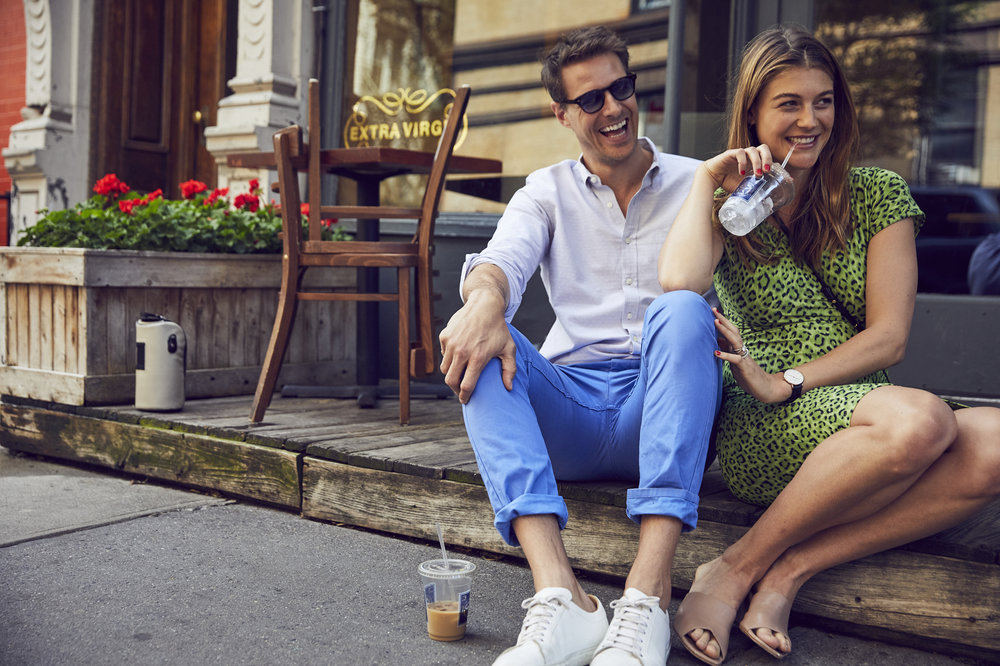
Delia Folk
BY
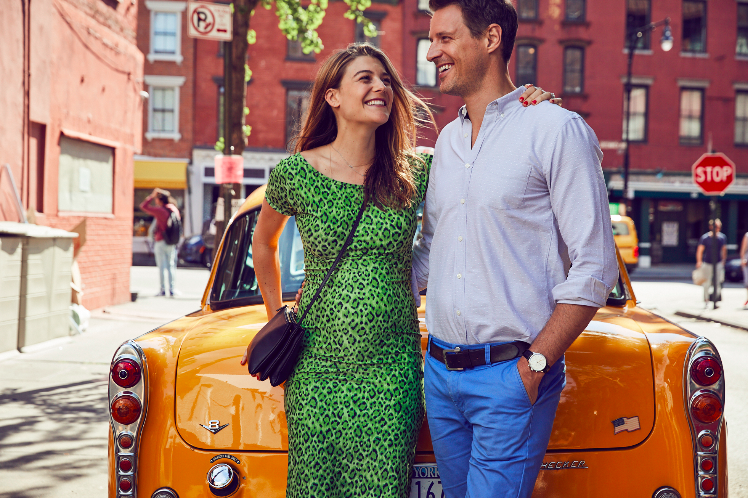
Wonderful interview! Such an inspirational couple for any entrepreneur to follow. Looks like such a healthy, happy and bright way to get your day started!